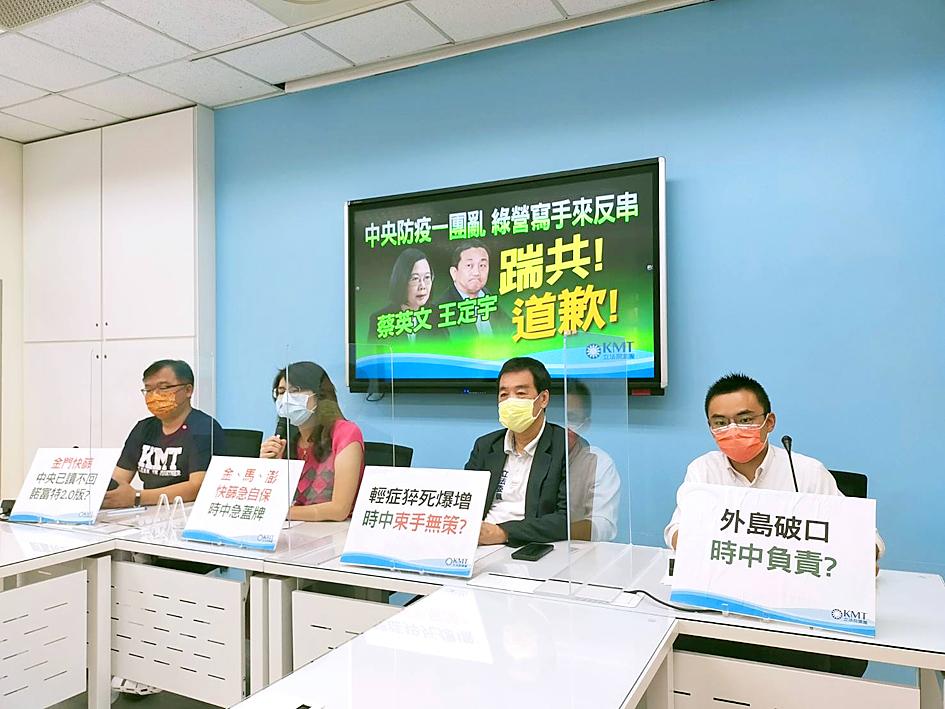The Democratic Progressive Party (DPP) “cannot escape blame” after Lin Wei-feng (林瑋豐), a political commentator, was found to have used his own anonymous posts as evidence that China was conducting cognitive warfare, opposition parties said yesterday.
Lin on Monday apologized on Facebook after reports said that he operated an account on the Professional Technology Temple (PTT) online bulletin board, posting content that appeared to support the Chinese Communist Party (CCP).
Lin on Monday posted on PTT’s gossip board using the bj26bj account, writing that the Centers for Disease Control (CDC) Line account is fake and calling for its “destruction,” reports said.

Photo courtesy of the KMT caucus
He posted screenshots of his own posts on Facebook, presenting them as evidence of Chinese cognitive warfare, reports said, adding that DPP Legislator Wang Ting-yu (王定宇) shared the Facebook post.
In his apology, Lin said that he has long participated in a “culture” of using different personas to debate politics online, a practice he has found “entertaining.”
The reports drew a heated response from opposition parties.
After the threat of Chinese manipulation during the 2018 local elections, the government passed laws against false news reports, the New Power Party (NPP) wrote on Facebook.
However, it seems that the threat is not only from Beijing, but also from the ruling party, the NPP wrote.
Lin attacked the government and supported the CCP, then used that activity to implicate Beijing, while DPP leaders used the PTT posts to call for an investigation, the NPP wrote.
Lin’s division of labor is clear and his excuse that he was just having fun has no merit, it wrote.
The NPP has itself experienced anonymous attacks indicative of the degradation of the nation’s online democratic environment, it wrote, adding that political parties that employ manipulative actions behind the scenes “cannot escape blame” and would be spurned by Taiwanese if they try to crush public opinion with manufactured debate.
The Taiwan People’s Party (TPP) called on the DPP to tell the public how long it has been engaged in cognitive warfare.
Even President Tsai Ing-wen (蔡英文) shared false information that Lin posted on Facebook, creating a major national security risk, TPP spokesman Tsai Chun-wei (蔡峻維) said, referring to a post on the president’s page urging people to “avoid being misled” and to not delete the CDC account.
The DPP says the nation must take precautions against cognitive warfare, yet it is leading the charge, Tsai Chun-wei said.
The Chinese Nationalist Party (KMT) said that the “ugliness of the DPP’s cyberarmy has fully manifested itself.”
It is sad that rather than fighting COVID-19, the DPP is fighting people’s perceptions, KMT caucus secretary-general Cheng Li-wun (鄭麗文) said.
The DPP has a close relationship with Lin and has long used such tactics, Cheng said, calling on the president, who is DPP chairperson, to publicly apologize.
The DPP distanced itself from Lin and called attempts to link online comments to it “absurd.”
Although Taiwan is a democracy with freedom of speech, people must take responsibility for their actions, DPP spokeswoman Yen Juo-fang (顏若芳) said.
Lin does not work for the DPP, nor has he been hired by the party, Yen said.
Repeated attempts by the KMT to link the DPP to the comments of individual personalities online are “absurd and out of focus,” she said.
Additional reporting by Chen Yun, Lin, Liang-sheng and Yang Chun-hui

A strong continental cold air mass is to bring pollutants to Taiwan from tomorrow, the Ministry of Environment said today, as it issued an “orange” air quality alert for most of the country. All of Taiwan except for Hualien and Taitung counties is to be under an “orange” air quality alert tomorrow, indicating air quality that is unhealthy for sensitive groups. In China, areas from Shandong to Shanghai have been enveloped in haze since Saturday, the ministry said in a news release. Yesterday, hourly concentrations of PM2.5 in these areas ranged from 65 to 160 micrograms per cubic meter (mg/m³), and pollutants were

Taiwan’s armed forces have established response protocols for a wide range of sudden contingencies, including the “Wan Chun Plan” to protect the head of state, the Ministry of Defense (MND) said today. After US President Donald Trump on Saturday launched a series of airstrikes in Venezuela and kidnapped Venezuelan President Nicolas Maduro, concerns have been raised as to whether China would launch a similar “decapitation strike” on Taiwan. The armed forces regularly coordinate with relevant agencies and practice drills to ensure preparedness for a wide range of scenarios, Vice Minister of National Defense Hsu Szu-chien (徐斯儉) told reporters before a

EVA Airways on Saturday said that it had suspended a pilot and opened an investigation after he allegedly lost his temper and punched the first officer several times as their plane was taxiing before takeoff at Los Angeles International Airport. According to a report published on Thursday by The Reporter, the incident occurred after the flight’s Malaysian first officer tried to warn the Taiwanese pilot, surnamed Wen (文), that he was taxiing faster than the speed limit of 30 knots (55.6kph). After alerting the pilot several times without response, the first officer manually applied the brakes in accordance with standard operating

Japanese Councilor Hei Seki (石平) on Wednesday said that he plans to visit Taiwan, saying that would “prove that Taiwan is an independent country and does not belong to China.” Seki, a member of the Japan Innovation Party, was born in Chengdu in China’s Sichuan Province and became a naturalized Japanese in 2007. He was elected to the House of Concilors last year. His views on the Chinese Communist Party (CCP) — espoused in a series of books on politics and history — prompted Beijing to sanction him, including barring Seki from traveling to China. Seki wrote on X that he intends